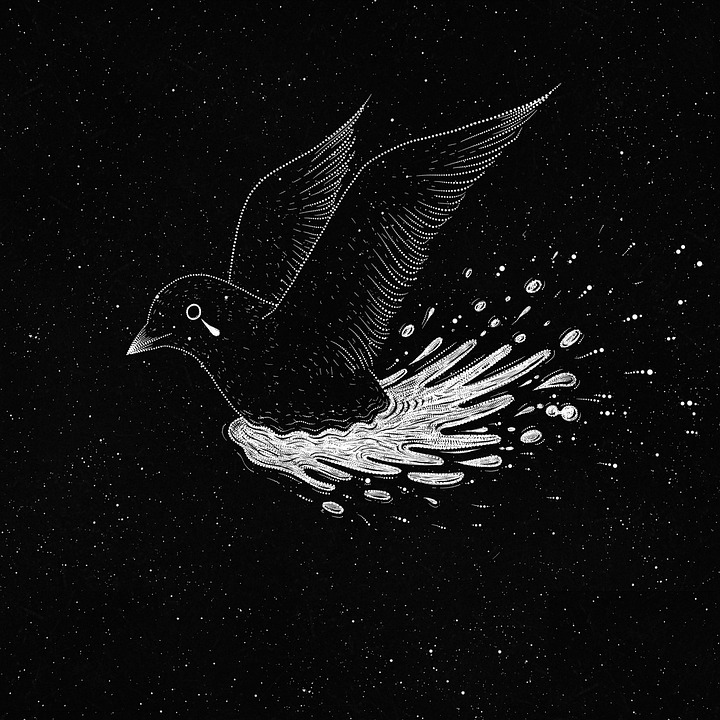
Meditation on "my tears ricochet"

Swiftie Scientists understand the importance of track five on Our Lady's albums, and Folklore's track five, "my tears ricochet," is a haunting ballad of betrayal, grief, and unspoken entanglement. Fans understand the very real betrayal that the song refers to, which we will not explore here. However, like so much of Our Lady's work, it contains oceans of Truth. On the surface, it is a lament - the narrative conjures images of attending your own funeral, watching someone you loved mourn you, and knowing they were the one who caused the pain. However, beneath this sorrowful vignette is a profound reflection on interdependence, the understanding that all things arise in relation to one another, that there is no self without the other.
Ego Mind and Ecomind
The lyric, "Even on my worst day, did I deserve, babe, all the hell you gave me?" reveals the paradox at the heart of interdependence: even in the midst of conflict, we remain bound to one another, not just emotionally, but existentially. In "my tears ricochet", the narrator is not free even in death; her tears, and the emotional fallout of the betrayal, reverberate through the space between her and her betrayer. The title itself suggests this connection: her pain rebounds, not just within herself, but through him. When we cause hurt, that hurt resonates; in our pain we are co-creators of suffering, locked in a mutual karmic echo.
The idea of karmic debt and reconciliation may seem strange in a meditation on interdependence - if the Truth is undifferentiated oneness, can one individual truly harm another? The answer is yes; interdependence is not the negation of individuality. As Thich Nhat Hanh taught, a flower contains sunshine, rain, and soil, but it is still uniquely a flower. Similarly, St. Taylor's music consistently upholds personal agency and growth, even within entangled narratives. "my tears ricochet" is a song of suffering, yes, but also of voice, of reclaiming our power to speak even from beyond the grave. Ego Mind and Ecomind coexist as long as we reside here in Relativity; the goal is the realization of the Truth even while accepting the 'reality' of material existence.
You Are, Therefore I Am
This phrase from the Vietnamese Zen master Thich Nhat Hahn encapsulates the core of interdependence. In my tears ricochet, Swift's character cannot escape the relationship, even after it has ended. The pain is not contained in one person; it arises between them, shaped by shared history. While Thich Nhat Hanh spoke those words in a spiritual context, Satish Kumar expands on them to explore relational existence in the broadest sense: that our identity is not self-created, but emerges through our connections with others: people, land, history, even ancestors. For Kumar, and for the narrator of this song, relationship is the basis of existence. We are because we relate. There is no isolated self.
Even in modern physics, particularly in approaches to quantum gravity, we encounter ideas echoing interdependence. Some theories suggest that space and time are not fundamental entities, but emerge from entangled relationships between particles. If this is correct, then there truly is no point in the universe that exists independently; it is all relational. The self and the other, like particles, influence and define each other through interaction.
Survival and Symbiosis
Alan Watts said, "You are an aperture through which the universe is looking at and exploring itself." In "my tears ricochet," St. Tay sings as both victim and witness, co-arising as karmic resonance connecting once again to her betrayer. In Our Lady's work, the 'I' is inseparable from the 'you.' Consider the lyric "you had to kill me, but it killed you just the same." This speaks directly to this reciprocity in a haunting motif - harm another, and you also harm yourself. Some may call such reciprocity the machinations of karma, and interdependence is certainly related to karma, but this goes deeper, and speaks to the simultaneous difference and non-difference of existence in relativity.
In his work, Alan Watts emphasized that the self is not an isolated ego, but a process, a pattern in the greater fabric of being. In "my tears ricochet," Our Lady explores the nature of these patterns, mourning not merely a lost love, but lost unity. "I didn't have it in myself to go with grace" suggests not just bitterness, but a collapse of a once-shared emotional ecosystem. The one who was everything is now the adversary, yet the adversary's existence continues to ripple through the fabric of the self. Interdependence means that when relationships change, the old imprints remain as the patterns of our being weave themselves anew.
In this context, "my tears ricochet" is a song not just of grief, but of compassionate witnessing. It allows the listener to visualize the way that pain echoes between beings, how the suffering we inflict or endure is never ours alone. To recognize interdependence is to take radical responsibility - not for everything that happens, but for how we reflect, and are reflected, in the world.
Our Lady reminds us that when we suffer, the tears we cry do not disappear - they ricochet. They change us, shape others, and return in ways we may never expect. To live fully, as both individuals and interconnected beings, is to acknowledge this echo, become conscious of it, and then to sing anyway.
Go now with the bravery to write your own story; to make your own folklore. May you ever remember that even when your tears fall, they echo as proof that you felt, you loved, and you lived. In the name of melody, memory, and midnights, Amen.
Rev. Odessa Cathode Ray, Tortured Pope
Follow Odessa on dobbs.town



